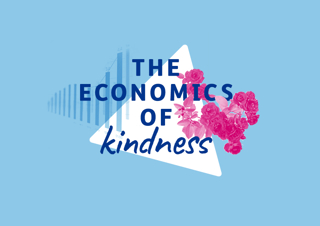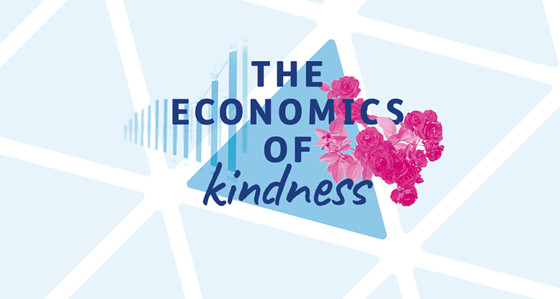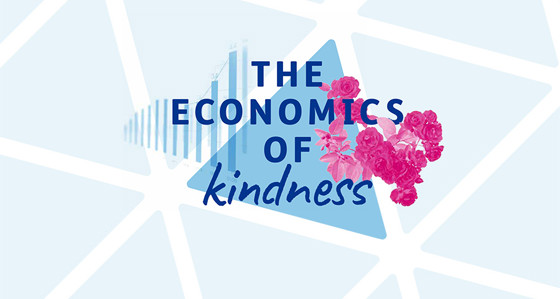
In the public sector, understanding the difference between kind and being nice is crucial. Being nice might be attractive in the short term, but being kind means being willing to do the hard thing when it is the right thing for the long term. This means leaving ego at the door, developing trusting and resilient organisations and leveraging kindness for long-term success.
In this article we take a look at the expert views gathered through our Economics of Kindness series, and explore how these principles can be applied to tackling government and public sector challenges.
Kindness as a catalyst for positive organisational impact
Kindness is a strategic tool that can foster positive organisational culture; employees who have trust in their organisation’s vision are more likely to feel comfortable and empowered at work and deliver better outcomes.
When the Scottish Government introduced its National Performance Framework (NPF) in 2018, it was aligned with the then First Minister’s aim for Scotland and the way the Scottish Government did business to be ‘characterised by kindness’. This had a direct policy impact that saw the Scottish Household Survey (SHS) introduce questions about whether people felt kindness in their neighbourhood, providing important data on how people perceived their communities and highlighting areas in which the public sector had to drive change.
Low-ego leadership as a driver of success
The value of low-ego leadership is highlighted as a key lesson by Elsbeth Johnson, MIT Sloan School of Management. Applying this lesson to the public sector can result in more effective and adaptable governance, focusing on the collective good rather than individual glory.
In 2020, Research commissioned by the Welsh First Minister into how Welsh public services develop future leaders found that the value of collaborative efforts - including sharing cross-sectoral experiences and investing in collective skills development - was central to enhancing leadership effectiveness in the public sector. But the research found that collaboration leadership was not enough in its own right; it must be paired with an outcomes focus to achieve success.
Balancing profit with people and planet
Shifting from a sole focus on profit to a triple bottom line – people, planet, profit – is as important for the public sector as it is for business. While UK Government doesn’t have profit-making priorities, delivering value for money should be a priority for public sector organisations. But this shouldn’t come at the expense of the wellbeing of citizens, environmental impact, and economic prosperity.
The Department for Education’s Sustainability and Climate Change Strategy for the Education and Children’s Services Systems highlights the department’s commitment to preparing young people for a world impacted by climate change, with a key focus on creating green jobs needed to deliver the government’s 25-Year Environment Plan. This approach balances the needs of young citizens while acknowledging that they will be essential to tackling climate change and helping nature’s recovery.
Kindness in organisational resilience
Kindness is invaluable when building organisational resilience in the public sector, where it is essential for weathering challenges and efficiently delivering services. In the UK, the public must trust the Civil Service to uphold principles of kindness – specifically impartiality, openness and honesty - while delivering for the Government of the day. This impartiality and transparency contributes to organisational resilience by ensuring that Civil Service advice is based on evidence, giving a stable, consistent and trusted approach to governance. Impartiality enhances the capability of the Civil Service to adapt to changing political landscapes while maintaining continuity of vital public service delivery and allows it to respond effectively to crises and challenges.
Kindness driving financial success
Government investment is often perceived as being inefficient with a focus on achieving monetary benefits. This can lead to adverse behaviours such as overclaiming benefit to boost the Net-Present Social Value (NPSV) or Benefits-Cost Ratio (BCR) of an initiative. Focusing on a wider sense of value, aligned to delivery of contributions to objectives and priorities rather than predominantly monetary metrics, has the potential to reap significant enhancement to the reputation, and effectiveness, of Government investment.
Elevating kindness to unlock the trust ‘wonder drug’
Government leaders – both politicians and officials – who adopt empathetic, respectful, and equitable approaches can inspire trust, leading to more effective governance. The Behavioural Insights Team (formerly part of the Cabinet Office, now an independent organisation) - also known as the “Nudge Unit” – has done extensive research into the benefits of trust in organisations and wider society.
BIT President David Halpern writes: “Social trust is like a social and economic policy wonder-drug. You can do a deal on a handshake and feel confident you won’t be ripped off. It improves the flow of information because high trust generally leads to more openness.”
By looking at statistics from the Covid pandemic, Halpern found that the data “suggests that a one percentage point increase in the level of trust in a country was associated with a -4.13 decrease in excess deaths per 100,000 people”. In short, trust can have a massive impact on outcomes for citizens, including public health.
Kindness as a way to boost retention
Incorporating kindness into organisational culture helps to attract and retain talent in the long term, leading to a more committed and productive workforce. In the Civil Service, bolstering recruitment and retention by aligning staff’s day-to-day work with overall organisational culture and values can help it to compete for talent with the private sector.
Many Civil Servants working in tough policy areas – from migration to criminal justice – experience the toll that challenging work can take emotionally and mentally. Kind and empathetic leadership in is especially important in these areas.
Summary
The Economics of Kindness is a transformative principle that goes beyond the realm of business, offering valuable lessons for governments and public sector. By embracing kindness, prioritising collective well-being, and adopting low-ego leadership, public bodies can foster resilience, collaboration, and long-term success in serving their staff and the wider public.
At Baringa, we work side-by-side with our Civil Service colleagues, solving complex problems and delivering on some of the biggest challenges, informed by the Economics of Kindness principles.
Learn more about how Baringa can help government departments
About the author
James Ashford joined Baringa in 2023 and has over seven years experience from across a variety of central government departments, including the Cabinet Office, Department for Business, Energy & Industrial Strategy (BEIS), HM Revenue & Customs (HMRC), and the Ministry of Defence (MoD), Foreign, Commonwealth & Development Office (FCDO), COP26 Unit and the Home Office. James has experience of delivering key Government strategic priorities and projects and has worked closely with ministers, civil service leaders and foreign governments to deliver major domestic and international projects and headline policy.
Meet our expert

Maria Lawson
Maria helps central government departments with their toughest problems. This could involve setting up vital data analytics programmes to inform real-time government decisions, designing operating models and capability plans for a department with 10,000 people, or using intelligent automation tools to improve efficiency and reduce costs.
No matter the project, Maria will be balancing the needs and goals of an array of stakeholders that could include local councils, senior ministers, healthcare advisers, other government departments and third-party providers.
Learn more
Public Sector Productivity
Productivity levels across public services of government are lagging behind the private sector, with many government departments and agencies struggling to connect their people with their core purpose.
At Baringa, we help our clients think more broadly about how to achieve more productive public services. Our government clients have unlocked sustained productivity improvements when we have worked together on what it truly means to be efficient and effective, starting with connecting people to purpose.
Learn moreRelated Insights
Trending content in this series

Introducing the Economics of Kindness
At Baringa we’re convinced that, no matter the macroeconomic backdrop, kindness in business really does pay. That’s why we’re taking this opportunity to explore the economics of kindness across four pillars: people, business, leadership and investors.
Read more
People – planet – profit, in that order
The notion of a ‘triple’ bottom line – people first, then planet, then profit – is reshaping how organisations around the world do business. They’re bringing corporate kindness to the fore as we enter a new type of economy, and the businesses that organise themselves in this way will be the ones that succeed.
Read more
Redefining kindness in the workplace
Corporate kindness is all about the impact an organisation has on the world, engaging in responsible practices that benefit their customers, employees, and the communities they operate in.
Read more
Bringing kindness back to the top of the leadership agenda
Should kindness be back at the top of the leadership agenda? Managing Partner Adrian Bettridge discusses how when we lead with kindness, we generate lasting success for ourselves, our clients and our businesses.
Read more
It’s not easy to be a kind leader
Can leaders be kind all of the time? What gets in the way? Ian Peters reflects on the challenges and trade-offs of trying to be kind to all stakeholders.
Read more
Our Economics of Kindness journey: the story so far
What have we learned about kindness in business and in our public organisations? Does it pay? And if so, how?
Read more